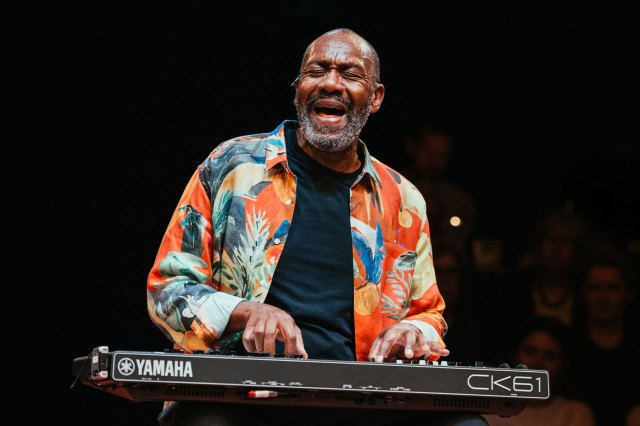Every Brilliant Thing review – Lenny Henry launches an all-star rotating cast season in the West End
The solo show, also set to feature Jonny Donahoe, Ambika Mod, Sue Perkins and Minne Driver, is being staged at London’s @sohoplace

First performed at the Edinburgh Fringe in 2014 (a lifetime ago), Duncan Macmillan’s one-person play Every Brilliant Thing has toured extensively regionally and internationally, building up a cult following. It now makes its West End debut headlined by Jonny Donahoe (the original performer and co-creator), Ambika Mod, Sue Perkins, Minnie Driver and, up first, Lenny Henry. Quite the eclectic bunch.
The piece is a hybrid of a dramatic monologue and stand-up in which the audience plays an active role. In the aftermath of his mother’s suicide attempt, a seven-year-old boy (or girl, depending on who’s performing) makes a list of all things that make life joyful, including ice cream, staying up late, and Mr Potato Head. He continues to develop the list into his teenage and adult life, reaching over a million entries. It’s clearly an incredibly moving device for most, but for a small minority, the writing is overly sentimental and simplistic and rather akin to a public service announcement for adolescents.
It’s interesting seeing this show within 24 hours of another show about mental health, Doug Wright’s highly entertaining and sardonic Good Night, Oscar, which uses humour as a tool to shock. While that play does end on a note of hope, it doesn’t try to be uplifting. This piece, on the other hand, is puppyishly keen to be liked and is imbued with a safe, Radio 4 kind of humour of which the risk-averse network president in Good Night, Oscar would probably find little to disapprove.
Henry is genial and jovial as always. The character lives in the shadow of his mother’s precarious mental health and a taciturn father whose mood is signified by the kind of jazz music playing in his study (anything atonal is a no-go). A kindly primary school librarian (such a job doesn’t exist anymore) proffers a sock puppet called Graham (at least, on press night) who’s easier to talk to than a human, and helps him to find refuge in books. These provide escape and later the revelation that fiction can influence real-life behaviours.

It’s always a risk being dependent on audience participation for the secondary characters. Last night, it was mostly successful with the gentleman chosen to be the dad really leaning into the paternal role, and the biggest ovation of the evening going to the lady who was tasked with reading a very long and pretentious entry, the kind that could only be written by a teenager.
Mindfulness and noticing the small things have become buzzwords in mental health and such techniques are undoubtedly valuable, though certainly not the be-all and end-all. This is a piece of work that is clearly hugely meaningful to many people, though I personally am wired to prefer comedy about mental health that’s less “feel good” and much more mordant.
















